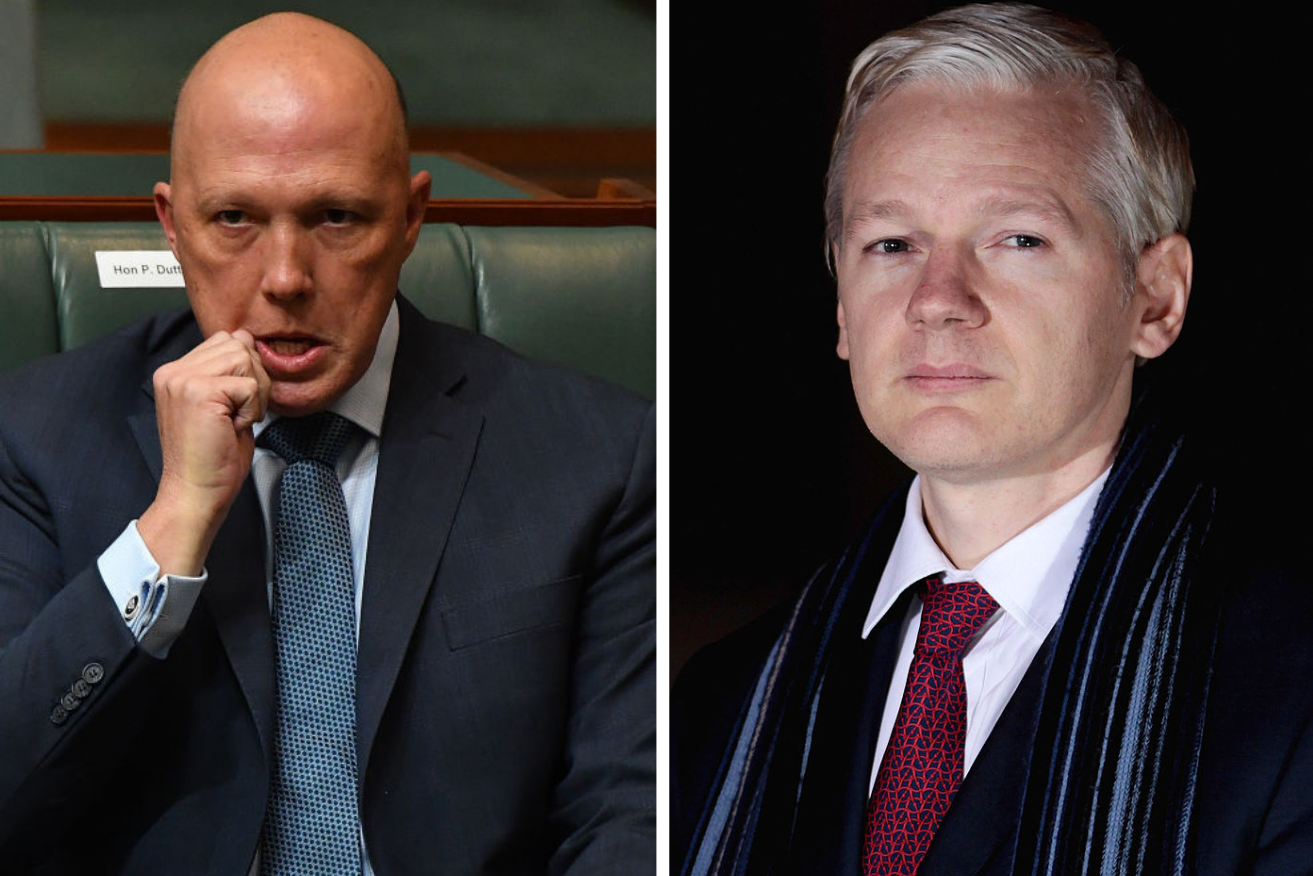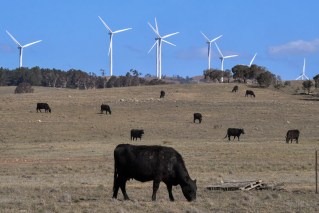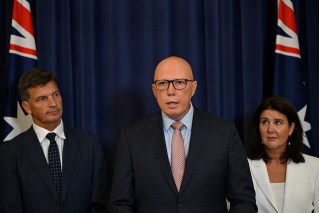Michael Pascoe: Political tea leaves – good for Assange, not so for Dutton


The fortunes of Peter Dutton and Julian Assange went in opposite directions, writes Michael Pascoe. Photo: TND/Getty
Think about it: Would the government have supported Andrew Wilkie’s “bring Assange home” motion if it didn’t have a nod that the Wikileaks publisher will be spared imprisonment in the United States?
The good news for the Assange camp this week was not of itself the overwhelming support of the Australian Parliament, 86 votes to 42, but the implication of the government’s unanimous backing.
Consider how embarrassing it would be for Prime Minister Albanese and Foreign Minister Wong if the Biden administration now raised a middle finger to the express desire of Parliament for Assange’s release.
Such a humiliation, being refused this one quite small request, would paint them both as impotent, Australia’s wishes as irrelevant and our relationship with the US entirely servile.
Would a canny Foreign Minister and a diplomatically engaged Prime Minister risk such a public slap down by the US of its “none-better” ally while Australia pledges eternal fealty via B-52, submarine, troop and spy bases on its soil? I find that unlikely.
It’s much easier to imagine what Ambassador Kennedy and her staff would/should be relaying to Washington: The Aussies are serious about wanting this; the alliance has been pretty much one-way traffic in America’s direction for as long as Joe Biden has been alive – and that’s a very long time; the bi-partisan Sinophobia in Washington gives AUKUS weight whatever happens in November; no other country is offering its defence force for secondment and paying for the privilege; don’t embarrass these guys over a relative trifle.
Beyond weasel words
The Wilkie motion moves beyond the weasel words previously deployed by the PM and Foreign Minister in describing Australia’s request to the US that the Assange matter “be brought to a conclusion”.
The Parliament’s impertinent display of independence also occurred in the same week that three of the Five Eyes again broke ranks a little with the US over Gaza, Australia joining with Canada and New Zealand in “warning” (if that’s the right word) Israel over its Rafah attack.
And in the US embassy’s steady reporting of Australian politics, it would be noted that Labor has had a lift, that the alternative government – the mob that mostly does not mind the US having its way with Assange – looks a little less relevant this week.
Whether a foreign agent or local journalist, it has been a more remarkable political week than most to analyse, the Assange motion only one element.
It was the week with more details about the ATO not knowing its pants were on fire over $2 billion worth of GST fraud, despite myriad tipoffs. It took Westpac to tell the RBA which told Treasury which told the ATO to notice the smoke and fire enveloping it.
Hundreds of millions in contracts
It was the week that found nobody was to be held responsible for contracts issued with, shall we say, a certain lack of due diligence for the Manus Island and Nauru offshore processing centres.
The concept of ministerial responsibility of course died somewhere in the second Howard government term, so the relevant minister at the time of the contracts, Peter Dutton, took comfort in that the investigation “did not see evidence of any ministerial involvement in the regional processing contract or procurement decisions, and the Secretary of Home Affairs said he never discussed such decisions with the Minister for Home Affairs”.
Hey, hundreds of millions of dollars in contracts but nothing for the minister to be hands-on about. It wasn’t as if there was someone’s au pair in a spot of visa trouble or anything like that.
For those consumed by racehorse journalism, the call of the week, perhaps the month, was made by Niki Savva on Thursday in the Nine papers:
“Ignore the spin and the dampening of expectations in the lead-up to the March 2 by-election. Dutton not only should win it, he has to win it.”
In a single column, Savva swung the pressure of the Dunkley by-election primarily onto Dutton’s shoulders just as the Albanese Government was enjoying a lift.
Labor holds Dunkley with a margin of 6.3 per cent, she wrote, which is the average swing over 40 years against governments at by-elections in seats they hold.
“The ABC’s election analyst Antony Green has noted that at eight by-elections in Labor seats during Labor governments, the average swing was 8.2 per cent.”
That 6.3 per cent was recorded as people voted against Scott Morrison for PM. Since then, interest rates have jumped, rents have soared, unemployment is rising and you can’t turn on a radio or TV station without hearing there is a “cost-of-living crisis”.
In these circumstances, failing to achieve that 6.3 per cent average swing would paint Dutton’s electoral appeal as no improvement on Morrison’s.
Lift for Labor
And despite the aforementioned circumstances, Labor’s rejig of the Stage 3 tax cuts has its tail up. Specifically, Labor voters’ consumer confidence has jumped into positive territory, opening a wide gap over that of Coalition voters – something that enjoys a strong correlation with electoral success.
It was commonly reported that the nation’s consumer sentiment had jumped to a 20-month high, according to the Westpac/Melbourne Institute consumer confidence survey published on Tuesday.
What was missed was that jump was almost entirely due to Labor voters, while Coalition voters’ sentiment dipped.
 It is standard for supporters of the party in government to be more optimistic than those supporting the opposition, a difference that narrows when the government’s electoral prospects are weak. In recent months, Labor supporters’ consumer sentiment index has opened up a strong gap, jumping by a hefty 10 points last month to 103.8 – the highest in more than two years – while the Coalition’s languished on 77.4.
It is standard for supporters of the party in government to be more optimistic than those supporting the opposition, a difference that narrows when the government’s electoral prospects are weak. In recent months, Labor supporters’ consumer sentiment index has opened up a strong gap, jumping by a hefty 10 points last month to 103.8 – the highest in more than two years – while the Coalition’s languished on 77.4.
The sentiment index for “Greens and others” improved 2 points to a still-low 77.4. Those with no declared voting intentions fell 3.4 to 71.1. The overall lift was Labor’s work.
The Melbourne Institute’s national survey may not match the sentiment of Dunkley voters, but it is a remarkable surge.
Dunkley voters have their own concerns, concerns that shouldn’t be favouring Labor if the Liberal Party was seen as a viable alternative – if Dutton was viewed as PM material, if he had credible shadow ministers.
The shadow treasurer is the man who established Australia’s strategic crude oil reserve on the United States’ Atlantic coast.
In the two weeks before the by-election, a little display of respect for the Albanese Government by the United States, instead of contempt, wouldn’t make much difference in Dunkley, but it wouldn’t do any harm either.








